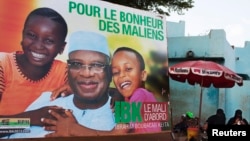DAKAR —
Mali's two main political parties pledged on Tuesday to accept the results of this month's presidential election even though it was likely to be marred by technical problems as the West African country struggles to emerge from conflict.
Both local politicians and international advocacy groups have voiced concern that voting materials will not be properly distributed in time for the July 28 election, which is meant to turn the page on a military coup in March 2012 and the subsequent Islamist seizure of northern Mali last year.
French forces intervened dramatically in January to break the grip of al-Qaida-linked Islamist groups over Mali's desert north. Paris is now pushing for the election to go ahead this month as it seeks to wind down its military presence, despite critics warning a botched vote could lead to future conflict.
“We are committed to accepting the results,” said Tiemoko Sangare, a member of the Alliance for Democracy in Mali (ADEMA) whose candidate Dramane Dembele is one of the leading contenders for the vote. ADEMA party leader Dioncounda Traore is serving as Mali's interim president after last year's coup.
“Everyone is aware that there are shortcomings but at the same time everyone says it's important that we hold these elections as soon as possible,” Sangare said.
During a visit to Paris on Monday, U.N. Secretary General Ban Ki-Moon asked that all candidates accept the results despite the strong potential for an “imperfect” electoral process.
The United Nations is rolling out a 12,000-strong peacekeeping mission. Paris, which has just over 3,000 soldiers in Mali, will cut its forces to 1,000 by year-end and is keen for a legitimately election government to take office to conduct peace talks with northern Tuareg separatist rebels.
In what is seen as an open race, 28 candidates are contesting the presidency. A run-off will take place on Aug. 11 if no one wins an outright majority in the first round.
With just under two weeks to go until the election, interior ministry officials have said that 68 percent of Mali's 6.8 million registered voters have received their voting cards.
However, that rate falls to just 20 percent in the northern province of Kidal. Civilian administration only returned last week after a June ceasefire deal was reached with Tuareg rebels who captured the remote desert region when Islamists fled.
Kidal has just 35,000 registered voters but has been the birthplace of successive uprisings by Tuaregs angry at its neglect by the southern government.
Pro-democracy groups have raised concerns that thousands of Malians displaced in camps in the landlocked country or in neighboring West African states may not be able to vote.
Tiebile Drame, a presidential hopeful and the government's chief negotiator in the ceasefire deal with the Tuaregs, has launched a court case to delay the vote, saying it would be illegal in current circumstances.
Both local politicians and international advocacy groups have voiced concern that voting materials will not be properly distributed in time for the July 28 election, which is meant to turn the page on a military coup in March 2012 and the subsequent Islamist seizure of northern Mali last year.
French forces intervened dramatically in January to break the grip of al-Qaida-linked Islamist groups over Mali's desert north. Paris is now pushing for the election to go ahead this month as it seeks to wind down its military presence, despite critics warning a botched vote could lead to future conflict.
“We are committed to accepting the results,” said Tiemoko Sangare, a member of the Alliance for Democracy in Mali (ADEMA) whose candidate Dramane Dembele is one of the leading contenders for the vote. ADEMA party leader Dioncounda Traore is serving as Mali's interim president after last year's coup.
“Everyone is aware that there are shortcomings but at the same time everyone says it's important that we hold these elections as soon as possible,” Sangare said.
During a visit to Paris on Monday, U.N. Secretary General Ban Ki-Moon asked that all candidates accept the results despite the strong potential for an “imperfect” electoral process.
The United Nations is rolling out a 12,000-strong peacekeeping mission. Paris, which has just over 3,000 soldiers in Mali, will cut its forces to 1,000 by year-end and is keen for a legitimately election government to take office to conduct peace talks with northern Tuareg separatist rebels.
In what is seen as an open race, 28 candidates are contesting the presidency. A run-off will take place on Aug. 11 if no one wins an outright majority in the first round.
With just under two weeks to go until the election, interior ministry officials have said that 68 percent of Mali's 6.8 million registered voters have received their voting cards.
However, that rate falls to just 20 percent in the northern province of Kidal. Civilian administration only returned last week after a June ceasefire deal was reached with Tuareg rebels who captured the remote desert region when Islamists fled.
Kidal has just 35,000 registered voters but has been the birthplace of successive uprisings by Tuaregs angry at its neglect by the southern government.
Pro-democracy groups have raised concerns that thousands of Malians displaced in camps in the landlocked country or in neighboring West African states may not be able to vote.
Tiebile Drame, a presidential hopeful and the government's chief negotiator in the ceasefire deal with the Tuaregs, has launched a court case to delay the vote, saying it would be illegal in current circumstances.





